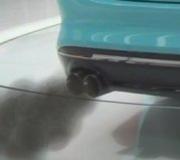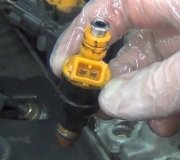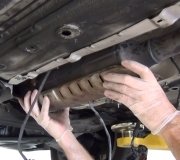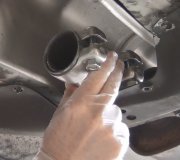Carbon buildup seems to be much less of a problem than many years ago, but who knows what happened with the previous owner. I CAN share that a former instructor had a regular customer who had a running problem about twice per year. He had it figured out that each time that car showed up, he took it out on the highway and started out at around 30 mph and stomped it to the floor for about five seconds. The engine ran fine after blowing out the rust and spider webs. Now, that was back in the mid '70s but still worth considering.
Another thing you might think about, since you mentioned the "putt-putt", is a burned valve. This too goes back to the '70s and affected a '78 LeBaron I still have sitting in my yard. The problem was mostly a problem of leaded gas going away. That lead acted as a lubricant and softened the valves landing on the seats. Some people said it was due to lower quality metals being used for the valve seats but it wasn't the seats that burned away; it was the valves.
The offending valve was one of the two middle ones on the passenger side. When cold, the heat-riser valve in the right exhaust manifold closes and the blocked exhaust from all four cylinders has to go through that one port, through a passage in the intake manifold to warm the base of the carburetor and choke thermostatic spring, then out the left side. That increased flow through that one sad passage might be a contributing factor to the burned valve but that only occurs for about five minutes when the engine is first started and is still cold. I can't say for sure if that's the causes of the burned valve but it does always seem to be the same one that is affected.
I am fairly certain the problem was addressed by 1986. Still, since you're hearing that sound at the tail pipe, you might want to consider performing a cylinder leakage test. Check the auto parts stores that rent or borrow tools to see if they have a tester. It involves pumping regulated compressed air into each cylinder, one at a time, when the piston is at top dead center on the compression stroke. To make it easy, there is a whistle you can hook to the tester's hose to tell you when the piston is coming up on the compression stroke. When it stops whistling, you're there. The gauge on the tester shows the percent of leakage, and you can listen in four places for the results of that leakage. If the exhaust valve is leaking you will hear hissing at the tail pipe.
Friday, April 29th, 2011 AT 4:32 AM







